|
|
|
Sort Order |
|
|
|
Items / Page
|
|
|
|
|
|
|
| Srl | Item |
| 1 |
ID:
091547
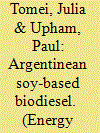

|
|
|
|
|
| Publication |
2009.
|
| Summary/Abstract |
This paper explores the economic, social and environmental context, drivers and impacts of increased demand for Argentine soy-based biodiesel. It is based on extensive stakeholder interviews in Argentina, including those in government, academia and the third sector; as well as participant observation with communities in soy cultivation areas; and review of relevant academic and grey literatures. Given Argentina's history of political instability and relatively weak levels of environmental protection, there is reason to be sceptical of the likely effectiveness of biofuel sustainability certification as applied to Argentine soy. Direct contracts between feedstock producers and biodiesel retailers may be a more reliable approach to minimise adverse environmental and social impacts than certification alone.
|
|
|
|
|
|
|
|
|
|
|
|
|
|
|
|
| 2 |
ID:
094295
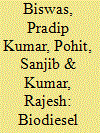

|
|
|
|
|
| Publication |
2010.
|
| Summary/Abstract |
The need for biofuels, particularly liquid ones like ethanol and biodiesel, has been felt by most of the countries and their governments have been trying to promote these fuels. Following in line with global trend, India declared its biofuel policy in which biodiesel, primarily from jatropha, would meet 20% of the diesel demand beginning with 2011-2012. In spite of the efforts made by the state, production of biodiesel, however, has not picked up at all. Doubt arises as to whether the country will be able to meet the target. It is felt that the government policy, particularly regarding land utilization, organizing cultivation of jatropha and pricing of jatropha seeds, needs to be more clear. This paper attempts to make an assessment of the state of India's biofuel programme and to identify the hurdles that policy-maker need to overcome to achieve the goal.
|
|
|
|
|
|
|
|
|
|
|
|
|
|
|
|
| 3 |
ID:
103329


|
|
|
|
|
| Publication |
2011.
|
| Summary/Abstract |
The promotion and use of renewable energy sources are established priorities worldwide as a way to reduce emissions of Greenhouse Gases and promote energy security. Australia is committed to reach a target of 350 ML of biofuels per year by 2010, and incentives targeted to producers and consumers have been placed. These incentives include zero excise until 2011 for the ethanol produced in Australia and gradual increase of the taxation rates reaching the full excise of 0.125 AUD per litre by 2015. This paper analyses the viability of the second generation ethanol industry in the Green Triangle, one of the most promising Australian regions for biomass production, by comparing the energy adjusted pump prices of petrol and the produced ethanol under different taxation rates and forecasted oil prices. Major findings suggest that under the current conditions of zero fuel excise and oil prices around 80US$ per barrel ethanol production is viable using biomass with a plant gate cost of up to 74 AUD per ton. Moreover, the forecasted increase in oil prices have a higher impact on the price of petrol than the increased ethanol excise on the pump price of the biofuel. Thus, by 2016 feedstock with a plant gate cost of up to 190 AUD per ton might be used for ethanol production, representing a flow of 1.7 million tons of biomass per year potentially mitigating 1.2 million tons of CO2 by replacing fossil fuels with ethanol.
|
|
|
|
|
|
|
|
|
|
|
|
|
|
|
|
| 4 |
ID:
109603


|
|
|
|
|
| Publication |
2011.
|
| Summary/Abstract |
There is a large interest in biofuels in India as a substitute to petroleum-based fuels, with a purpose of enhancing energy security and promoting rural development. India has announced an ambitious target of substituting 20% of fossil fuel consumption by biodiesel and bioethanol by 2017. India has announced a national biofuel policy and launched a large program to promote biofuel production, particularly on wastelands: its implications need to be studied intensively considering the fact that India is a large developing country with high population density and large rural population depending upon land for their livelihood. Another factor is that Indian economy is experiencing high growth rate, which may lead to enhanced demand for food, livestock products, timber, paper, etc., with implications for land use. Studies have shown that area under agriculture and forest has nearly stabilized over the past 2-3 decades. This paper presents an assessment of the implications of projected large-scale biofuel production on land available for food production, water, biodiversity, rural development and GHG emissions. The assessment will be largely focused on first generation biofuel crops, since the Indian program is currently dominated by these crops. Technological and policy options required for promoting sustainable biofuel production will be discussed.
|
|
|
|
|
|
|
|
|
|
|
|
|
|
|
|
| 5 |
ID:
125605
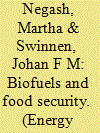

|
|
|
|
|
| Publication |
2013.
|
| Summary/Abstract |
There is considerable controversy about the impact of biofuels on food security in developing countries. A major concern is that biofuels reduce food security by increasing food prices. In this paper we use survey evidence to assess the impact of castor production on poor and food insecure rural households in Ethiopia. About 1/3 of poor farmers have allocated on average 15% of their land to the production of castor beans under contract in biofuel supply chains. Castor production significantly improves their food security: they have fewer months without food and the amount of food they consume increases. Castor cultivation is beneficial for participating households' food security in several ways: by generating cash income from castor contracts, they can store food for the lean season; castor beans preserve well on the field which allows sales when farmers are in need of cash (or food); spillover effects of castor contracts increases the productivity of food crops. Increased food crop productivity offsets the amount of land used for castor so that the total local food supply is not affected.
|
|
|
|
|
|
|
|
|
|
|
|
|
|
|
|
| 6 |
ID:
101398


|
|
|
|
|
| Publication |
2011.
|
| Summary/Abstract |
We examined the co-evolution of the transportation, and electricity and heat generation sectors in the Netherlands until 2040 using a MARKAL bottom-up cost optimisation model.
All scenario variants investigated indicate a switch away from crude oil-based diesel and petrol for transportation. Lowest overall CO2 abatement cost is achieved by accommodating transportation first and using relatively expensive options for emissions reduction in electricity generation if needed.
Biomass and carbon capture and storage (CCS) are used to full potential. Transportation CO2 emissions are reduced by switching to ethanol or bio-based synthetic fuels combined with CCS, and series hybrid cars if needed. Depending on the availability of biomass and carbon storage capacity, electricity is produced from biomass, coal with CCS, or wind complemented with natural gas. Indirect greenhouse gas emissions rise to 34-54% of national emissions in 2040.
The difference in annual investment required between the scenario variants with and without CO2 emissions reductions of 68% by 2040 is 4-7 billion euro/year, or 0.5-1.2% of projected GDP.
Investment costs are mostly determined by the cost of cars and electricity generation capacity. We observe competition for limited biomass supply and CO2 storage capacity between the transportation and power sectors.
|
|
|
|
|
|
|
|
|
|
|
|
|
|
|
|
| 7 |
ID:
168665
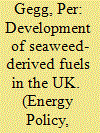

|
|
|
|
|
| Summary/Abstract |
Macroalgae (seaweed)-derived fuels are gaining increasing attention due to the high rate of seaweed growth, its lack of lignocellulose (which makes for energy-efficient processing), its lack of need for land or freshwater, and its potential suitability for commercial applications in the UK. However, while technological issues are progressively being solved, wider issues of stakeholder and public perception have largely been ignored, potentially hindering the development of this technology. This research fills this gap by conducting 19 interviews with stakeholders and 7 focus groups with members of the public to gain a deeper and broader understanding of perceptions of macroalgae-derived fuels. The results highlight the technological promise and confidence in the potential of macroalgae-derived fuels. However, they also emphasise conflicts and uncertainties among stakeholders (e.g. competition with other high-value products derived from macroalgae) and the general public (e.g. conflict with marine users). This paper provides insight into potential social resistance and key issues in the macroalgae-to-fuels supply chain. This information will enable two-way communication between everyone involved and increase the likelihood of successfully developing this supply chain. Key policy issues are discussed to facilitate this communication and encourage investment in the process.
|
|
|
|
|
|
|
|
|
|
|
|
|
|
|
|
| 8 |
ID:
127206
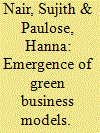

|
|
|
|
|
| Publication |
2014.
|
| Summary/Abstract |
Emergent business models seek to take advantage of new market mechanisms driven by technological changes, particularly those related to the production and delivery of clean or sustainable energy. Such business models often function at the intersection of various industries, with global views, and the resulting systems have distinct social, political, environmental, economic, technological, and business dimensions. Such holistic systems are not only difficult to develop but also require support from a broad range of actors with effective regulations and policies in place, such that the firm functions within a framework that integrates various factors. This study substantiates such a framework by detailing the nascent algae-based bio-fuel industry that caters to the aviation sector while arguing that businesses in the energy industry can emerge as a next-practice platform that drive a sixth wave of innovation. The framework begins with three basic enablers, innovation, flexibility, and sustainability, and explains how value from renewable energy technologies can be created and captured sustainably and innovatively with new market mechanisms implemented by firms with green business models.
|
|
|
|
|
|
|
|
|
|
|
|
|
|
|
|
| 9 |
ID:
131365


|
|
|
|
|
| Publication |
2014.
|
| Summary/Abstract |
Despite criticism, global biofuel production continues to rise, using primarily food crops. Between 2001 and 2012 it increased nearly six-fold, driven primarily by domestic policies, yet raising strong international concerns, eg over impacts on global food prices. Nevertheless, little international biofuel governance has emerged. This article examines the various extraterritorial dimensions of domestic biofuel policies and investigates why international biofuel governance has remained vague, despite its controversial nature. It uses the politics of scale to analyse why countries may wish to frame it as a global or domestic issue. Three extraterritorial dimensions are identified: global environmental impacts, global socioeconomic impacts, and attempts at extraterritorial control over biofuel production abroad. While major producers have successfully avoided liability for impacts by preventing the scaling up of much biofuel governance to the international level, major importers have tried to fill perceived governance gaps using policies aimed at extraterritorial control. We show that both the rise of nationally oriented development policies with extraterritorial impacts and of unilateral sustainability rule making primarily affect weaker countries, making global inequalities more pronounced. It is essential that adaptation governance take into account both environmental and global socioeconomic changes, such as higher agricultural commodity prices.
|
|
|
|
|
|
|
|
|
|
|
|
|
|
|
|
| 10 |
ID:
125485


|
|
|
|
|
| Publication |
2013.
|
| Summary/Abstract |
This paper identifies conventional liquid fossil fuels that can be replaced or blended with biofuel and quantifies the biofuels required to meet the Indonesian biofuel target of at least 5% of the total primary energy mix in 2025. The analysis was conducted using the Long range Energy Alternatives Planning (LEAP) system with an energy elasticity of 1 and maximum allowable biofuel blending ratios according to the current best practices. The results show that the target could be achieved with the maximum blending alternative based on constant energy demand growth of 6%. The target requires a total contribution from biofuel of about 8-27 GL in 2025 depending on blending ratios. In energy terms, these are equivalent to 232-782 PJ or about 40-135 million barrels crude oil, which constitute roughly around 3.3-11.0% of the estimated liquid fossil fuel oil annual consumption in that year. The results imply that it may have detrimental environmental impact, as it requires 5.2 million ha of palm oil and sugar cane plantations. On the positive side, achieving the target offers potential new employment opportunities of about 3.4 million jobs, particularly in the agricultural sector relevant to liquid biofuel production.
|
|
|
|
|
|
|
|
|
|
|
|
|
|
|
|
| 11 |
ID:
093519


|
|
|
|
|
| Publication |
2010.
|
| Summary/Abstract |
Sorting out the impacts of biofuels on global agricultural commodity prices is impossible without turning to data and distinguishing between the short-run versus the long-run impacts. Using time-series prices on fuels and agricultural commodities, the aim is to investigate the long-run cointegration of these prices simultaneously with their multivariate short-run interactions. Results indicate no direct long-run price relations between fuel and agricultural commodity prices, and limited if any direct short-run relationships. In terms of short-run price movements, sugar prices are influencing all the other agricultural commodity prices except rice. With sugar the number one world input for ethanol, results indicate increased ethanol production is potentially influencing short-run agricultural commodity prices. Overall, results support the effect of agricultural commodity prices as market signals which restore commodity markets to their equilibria after a demand or supply event (shock).
|
|
|
|
|
|
|
|
|
|
|
|
|
|
|
|
| 12 |
ID:
192774
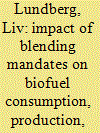

|
|
|
|
|
| Summary/Abstract |
The transport sector accounts for about 20% of EU's GHG-emissions. Progress in emission reductions has been slow and primarily driven by biofuels promoted through national blending mandates. The mandates differ in whether they are measured in volume, energy, or emission reduction and in how gasoline and diesel are targeted. Due to this, national mandates and their effects have not previously been quantitatively compared on an EU level. In this article we convert the mandates for all EU member states between 2009 and 2020 to a common unit and study their impact on biofuel consumption, production, emission reductions and fuel prices. We find that mandates are driving biofuel consumption in the EU and correlates with emission reductions. Increased mandates have however often been fulfilled by blending biofuels eligible for double counting. We also find that reduction mandates have been effective in encouraging high-performance biofuels. For historical fuel prices, we do not see a clear correlation between countries' shares of biofuel and consumer fuel prices while the global oil price has a considerable impact. For biofuel production, increased demand drive investments in the EU, but when it comes to localisation of new plants factors such as local infrastructure are more important than national mandates.
|
|
|
|
|
|
|
|
|
|
|
|
|
|
|
|
| 13 |
ID:
090066


|
|
|
|
|
| Publication |
2009.
|
| Summary/Abstract |
The rise in oil prices has spurred interest in biofuels. Policies in the United States like the renewable fuel standard (RFS) have led to an expansion of ethanol production, while the New Zealand government has mandated a minimum level of biofuel sales.
The research used a partial equilibrium model of international trade to quantify the price and farmgate income effects of the US RFS policy. The goal was to examine the competition between food and biofuel production and to quantify the impact of the policy on the agricultural sector in New Zealand.
The RFS policy has a significant impact on corn prices, but a small effect on livestock prices and production. There thus appears to be little conflict between food and fuel uses for corn at the level of the RFS mandate. New Zealand's pasture-based livestock sector benefits from the use of corn for ethanol production: it receives better prices for its products, but does not face the same input cost increases as competitors. The results suggest that New Zealand faces an interesting decision: it could support investment in biofuels research, or benefit from the biofuels boom through the indirect impacts on demand and prices for meat and milk.
|
|
|
|
|
|
|
|
|
|
|
|
|
|
|
|
| 14 |
ID:
110412


|
|
|
|
|
| Publication |
2011.
|
| Summary/Abstract |
State and regional policies, such as low carbon fuel standards (LCFSs), increasingly mandate that transportation fuels be examined according to their greenhouse gas (GHG) emissions. We investigate whether such policies benefit from determining fuel carbon intensities (FCIs) locally to account for variations in fuel production and to stimulate improvements in FCI. In this study, we examine the FCI of transportation fuels on a lifecycle basis within a specific state, Minnesota, and compare the results to FCIs using national averages. Using data compiled from 18 refineries over an 11-year period, we find that ethanol production is highly variable, resulting in a 42% difference between carbon intensities. Historical data suggests that lower FCIs are possible through incremental improvements in refining efficiency and the use of biomass for processing heat. Stochastic modeling of the corn ethanol FCI shows that gains in certainty due to knowledge of specific refinery inputs are overwhelmed by uncertainty in parameters external to the refiner, including impacts of fertilization and land use change. The LCA results are incorporated into multiple policy scenarios to demonstrate the effect of policy configurations on the use of alternative fuels. These results provide a contrast between volumetric mandates and LCFSs.
|
|
|
|
|
|
|
|
|
|
|
|
|
|
|
|
| 15 |
ID:
150071


|
|
|
|
|
| Summary/Abstract |
Biofuel policies are motivated by a plethora of political concerns related to energy security, environmental damages, and support of the agricultural sector. In response to this, much scientific work has chiefly focussed on analysing the biofuel domain and on giving policy advice and recommendations. Although innovation has been acknowledged as one of the key factors in sustainable and cost-effective biofuel development, there is an urgent need to investigate technological trajectories in the biofuel sector by starting from consistent data and appropriate methodological tools. To do so, this work proposes a procedure to select patent data unequivocally related to the investigated sector, it uses co-occurrence of technological terms to compute patent similarity and highlights content and interdependencies of biofuels technological trajectories by revealing hidden topics from unstructured patent text fields. The analysis suggests that there is a breaking trend towards modern generation biofuels and that innovators seem to focus increasingly on the ability of alternative energy sources to adapt to the transport/industrial sector.
|
|
|
|
|
|
|
|
|
|
|
|
|
|
|
|
| 16 |
ID:
105758
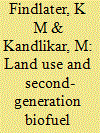

|
|
|
|
|
| Publication |
2011.
|
| Summary/Abstract |
Governments around the world see biofuels as a common solution to the multiple policy challenges posed by energy insecurity, climate change and falling farmer incomes. The Indian government has enthusiastically adopted a second-generation feedstock - the oilseed-bearing shrub, Jatropha curcas - for an ambitious national biodiesel program. Studies estimating the production capacity and potential land use implications of this program have typically assumed that the 'waste land' slated for Jatropha production has no economic value and that no activities of note will be displaced by plantation development. Here we examine the specific local impacts of rapid Jatropha plantation development on rural livelihoods and land use in Rajasthan, India. We find that in Jhadol Tehsil, Jatropha is planted on both government and private land, and has typically displaced grazing and forage collection. For those at the socioeconomic margins, these unconsidered impacts counteract the very benefits that the biofuel programs aim to create. The Rajasthan case demonstrates that local land-use impacts need to be integrated into decision-making for national targets and global biofuel promotion efforts.
|
|
|
|
|
|
|
|
|
|
|
|
|
|
|
|
| 17 |
ID:
127249


|
|
|
|
|
| Publication |
2014.
|
| Summary/Abstract |
This study analyses battery electric vehicles (BEVs) in the future German power system and makes projections of the BEVs hourly load profile by car size ('mini', 'small', 'compact' and 'large'). By means of a power plant dispatching optimisation model, the study assesses the optimal BEV charging/discharging strategies in grid-to-vehicle (G2V) and vehicle-to-grid (V2G) schemes. The results show that the 2% rise in power demand required to power these BEVs does not hamper system stability provided an optimal G2V scheme is applied. Moreover, such BEV deployment can contribute to further integrating wind and solar power generation. Applying a V2G scheme would increase the capacity factors of base and mid-load power plants, leading to a higher integration of intermittent renewables and resulting in a decrease in system costs. However, the evaluation of the profitability of BEVs shows that applying a V2G scheme is not a viable economic option due to the high cost of investing in batteries. Some BEV owners would make modest profits (€6 a year), but a higher number would sustain losses, for reasons of scale. For BEVs to become part of the power system, further incentives are necessary to make the business model attractive to car owners
|
|
|
|
|
|
|
|
|
|
|
|
|
|
|
|
| 18 |
ID:
166303


|
|
|
|
|
| Summary/Abstract |
The United States (US) Renewable Fuel Standard and California's Low Carbon Fuel Standard support the use of soy biodiesel and renewable diesel in the transport fuel supply for climate mitigation. However, linkages between the markets for soy oil and palm oil, which is associated with very high land use change emissions, could negatively affect the climate performance of soy-based biofuels. This study estimates the own and cross-price elasticities for the supply of soy and palm oils in the US using country-level data from 1992 to 2016 under rational expectations, through a seemingly unrelated regressions system of equations. We find a positive cross-price elasticity of palm oil import with respect to soy oil price and a positive reaction of supply of soy oil to increase in prices of palm oil. These results suggest that US biofuel policies may underestimate substitution between soy and palm oils and thus overestimate the climate benefits from soy-based biofuel.
|
|
|
|
|
|
|
|
|
|
|
|
|
|
|
|
| 19 |
ID:
103384
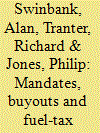

|
|
|
|
|
| Publication |
2011.
|
| Summary/Abstract |
Many governments mandate the blending of biofuels with fossil fuel supplies. The paper raises the possibility that some firms might choose not to respect such mandates, and cites the UK's experience, where a buyout of the obligation is possible. A simple economic framework is then used to explore some implications of mandate buyouts, including situations when buyouts and road-fuel-tax rebates are applied together. Finally, it discusses the design of buyout-mandate schemes that could release raw materials from biofuel production, following a future world food price shock.
|
|
|
|
|
|
|
|
|
|
|
|
|
|
|
|
| 20 |
ID:
132638


|
|
|
|
|
| Publication |
2014.
|
| Summary/Abstract |
The 2013 renewable energy policy mandates adopted in twenty-seven countries will increase the need for liquid biofuels. To achieve this, ethanol produced from corn and sugarcane will need to increase from 80 to approximately 200 billion l in 2021. This could be achieved by increasing the productivity of raw material per hectare, expansion of land into dedicated biofuels, or a combination of both. We show here that appropriate land expansion policies focused on conservationist programs and a scientific basis, are important for sustainable biofuel expansion whilst meeting the increasing demand for food and fiber. The Brazilian approach to biofuel and food security could be followed by other nations to provide a sustainable pathway to renewable energy and food production globally.
|
|
|
|
|
|
|
|
|
|
|
|
|
|
|
|
|
|
|
|
|